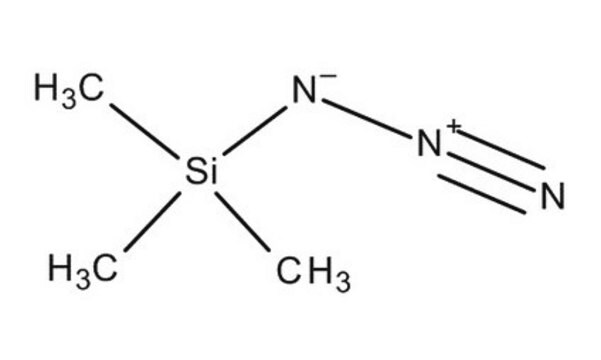191892
Hydroxypropyl cellulose
average Mw ~370,000, powder, 20 mesh particle size (99% through)
Sinónimos:
HPC
About This Item
Productos recomendados
description
biological oxygen demand (BOD) 14,000 ppm
form
powder
autoignition temp.
752 °F
mol wt
average Mw ~370,000
impurities
<5 wt. %
particle size
20 mesh (99% through)
pH
5.0-8.5
interfacial tension mineral oil
12.5 dyn/cm, 0.1 wt. % in H2O (vs. mineral oil)
viscosity
150-400 cP, 2 wt. % in H2O(25 °C, Brookfield, spindle #2) (60 rpm)(lit.)
solubility
H2O: insoluble (above 45 °C)
polar organic solvents: soluble
density
0.5 g/mL at 25 °C (lit.)
InChI
1S/C12H20N2/c1-5-12(13)11-7-6-10(14(3)4)8-9(11)2/h6-8,12H,5,13H2,1-4H3
InChI key
RRHXDYJWVYFMKV-UHFFFAOYSA-N
¿Está buscando productos similares? Visita Guía de comparación de productos
Categorías relacionadas
General description
Application
Storage Class
11 - Combustible Solids
wgk_germany
WGK 1
flash_point_f
Not applicable
flash_point_c
Not applicable
ppe
Eyeshields, Gloves, type N95 (US)
Certificados de análisis (COA)
Busque Certificados de análisis (COA) introduciendo el número de lote del producto. Los números de lote se encuentran en la etiqueta del producto después de las palabras «Lot» o «Batch»
¿Ya tiene este producto?
Encuentre la documentación para los productos que ha comprado recientemente en la Biblioteca de documentos.
Los clientes también vieron
Nuestro equipo de científicos tiene experiencia en todas las áreas de investigación: Ciencias de la vida, Ciencia de los materiales, Síntesis química, Cromatografía, Analítica y muchas otras.
Póngase en contacto con el Servicio técnico






